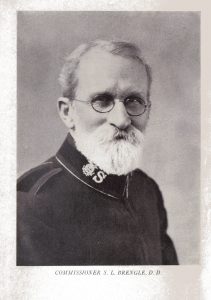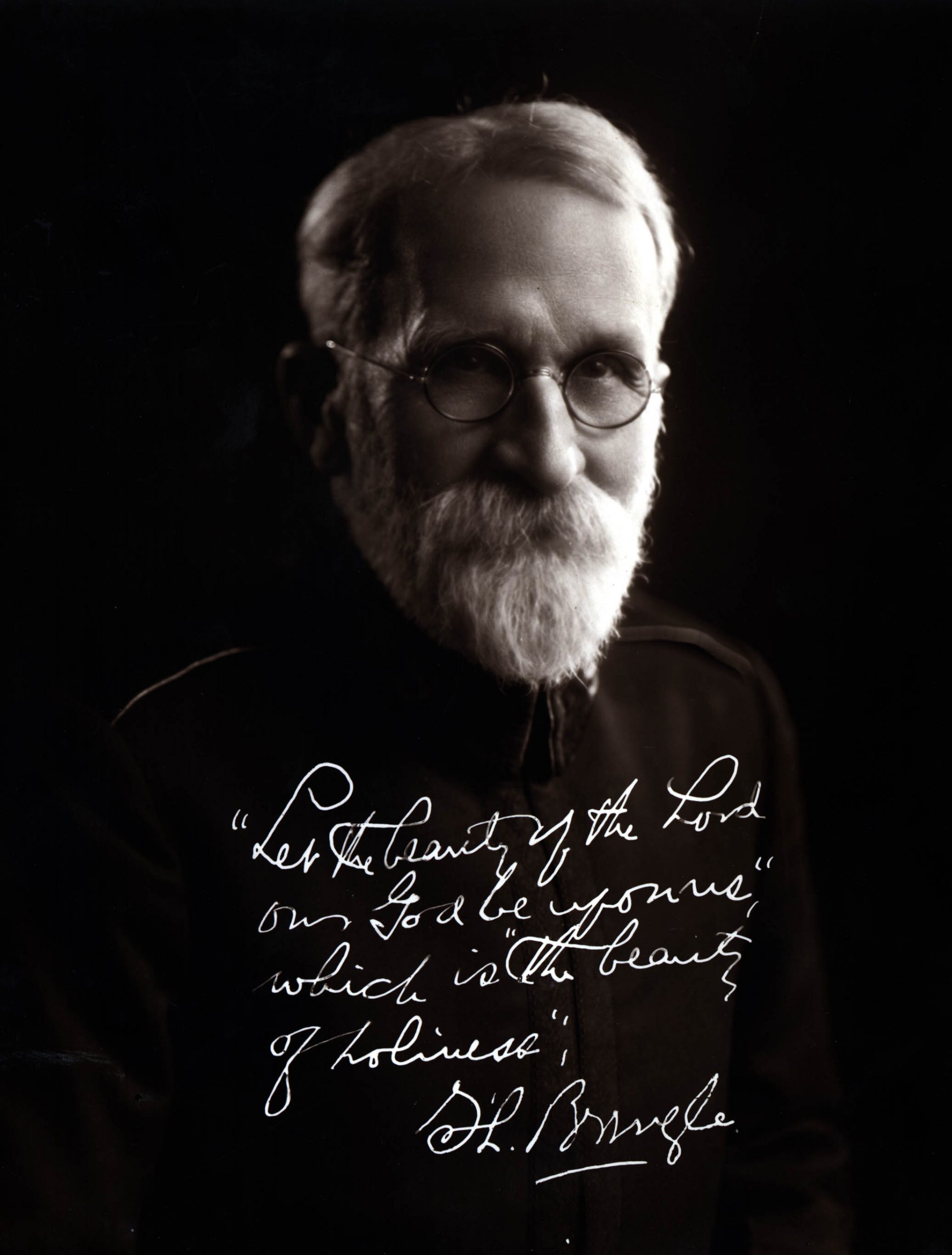Editor’s Note: Samuel Logan Brengle (1860-1936) attended DePauw University in Greencastle, Indiana, and later Boston Theological Seminary. He received offers to pastor a number of large Methodist churches but joined the Salvation Army and began by shining the shoes of other cadets. He proved himself as a godly and humble young preacher and received a commission to preach in Boston. Thus began a prolific ministry of over 40 years that included authoring many books and pamplets.
“And ye have forgotten the exhortation which speaketh unto you as unto children, My son, despise not thou the chastening of the Lord, nor faint when thou art rebuked of him: For whom the Lord loveth he chasteneth, and scourgeth every son whom he receiveth. If ye endure chastening, God dealeth with you as with sons; for what son is he whom the father chasteneth not?” But if ye be without chastisement, whereof all are partakers, then are ye bastards, and not sons. —Heb. 12:5-8
‘If ye endure chastening,’ wrote the Apostle to the Hebrews — and that word ‘chastening , means child-discipline for purposes of training — ‘If ye endure chastening, God dealeth with you as with sons; for what son is be whom the father chasteneth not? But if ye be without chastisement (or discipline), whereof all are partakers, then are ye bastards, and not sons ‘ (Hebrews xii. 7, 8).
If I should turn to the Commentaries of Matthew Henry, Adam Clark, Jamieson, Fawcett, and Brown, or others, I should probably find some wise and useful comments on these verses. But life itself will furnish the best and most instructive comment to the man with opened eyes, who observes, meditates, thinks, and remembers the chastenings of his own youth.
 For some days I have been an amused and deeply interested observer of the chastening or discipline of one of my little grandsons who is not yet a year old. He is almost bursting with ‘pep.’ He simply bubbles over with life. One of his chief joys is to get into his bath. It is perfectly delicious to watch him as he kicks and coos and gurgles and splashes water all over himself and any one who comes near, and blinks when water pops into his eyes, and revels in one of the chief joys of his young life. But how the little ignoramus does loath being undressed and redressed before and following his bath! He kicks and flourishes his arms in impatient protest, cries and objects in all manner of baby ways, while his insistent mother ignores all his objections, not asking what he likes, putting on him such clothes as she thinks best, plumps him into his baby-carriage, and wheels the rosy little rogue out on to the porch for his morning nap in the sunshine and soft spring winds.
For some days I have been an amused and deeply interested observer of the chastening or discipline of one of my little grandsons who is not yet a year old. He is almost bursting with ‘pep.’ He simply bubbles over with life. One of his chief joys is to get into his bath. It is perfectly delicious to watch him as he kicks and coos and gurgles and splashes water all over himself and any one who comes near, and blinks when water pops into his eyes, and revels in one of the chief joys of his young life. But how the little ignoramus does loath being undressed and redressed before and following his bath! He kicks and flourishes his arms in impatient protest, cries and objects in all manner of baby ways, while his insistent mother ignores all his objections, not asking what he likes, putting on him such clothes as she thinks best, plumps him into his baby-carriage, and wheels the rosy little rogue out on to the porch for his morning nap in the sunshine and soft spring winds.
All this to him is chastening, discipline, training. It is not severe, it is gentle and wise, but to him much of it is ‘grievous.’ ‘Now no chastening for the present seemeth to be joyous,’ writes the Apostle, ‘but grievous: nevertheless afterward’ — let us note this ‘nevertheless afterward’ and give thanks and be humble — ‘nevertheless afterward it yieldeth the peaceable fruit of righteousness unto them which are exercised thereby.’ The baby will learn slowly, but surely, through this unwavering process that he must submit to rightful authority and superior wisdom, and that not that which is at present pleasant, but that which is right and good must come first; then some day he will discover that all this ‘grievous’ insistence of his unyielding mother was but the expression of wise, thoughtful, sacrificial love.
‘God dealeth with you as with sons.’ ‘Whom the Lord loveth He chasteneth.’ ‘Behold, happy is the man whom God correcteth: therefore despise not thou the chastening of the Almighty: For He maketh sore, and bindeth up; He woundeth, and His hands make whole’ (Job v.17, 18).
If his father and mother are wise, their chastening, or discipline, will grow with the growth and unfold with the unfolding of this baby boy. They will probably often find themselves sorely perplexed, their hearts will be searched, and they will discover that their own minds and spirits are being disciplined, chastened, in ways that to them are for the present ‘grievous.’ But if they are humble and prayerful and patient and trustful, and always putting the right and the good first, they will find that while they discipline the child, God in love is training them, and bringing them into intimate, understanding fellowship with Himself in His great and sore travail to save and train a fallen race that wants its own way and prefers pleasure to righteousness. And, if they are wise, they will note that God is just as insistent in disciplining them as they are in disciplining their baby boy, and for the same reason — for their good.
As the baby gets older the discipline at times may have to be sterner and more severe. If he will yield to their word, happy will he be; but if he will not be guided by word, then it may be necessary to use the rod. ‘The rod and reproof give wisdom,’ wrote Solomon, ‘but a child left to himself bringeth his mother to shame.’ I do not know that I can improve upon Solomon; he mentions the rod before reproof, but I would suggest reproof before the rod. Gentle measures should first be used. The Lord pleads with His people. ‘Be ye not as the horse and the mule, which have no understanding: whose mouth must be held in with bit and bridle.’ He has a better, gentler way: ‘I will instruct thee and teach thee in the way which thou shalt go: I will guide thee with Mine eye,’ He says (Psalm xxxii. 8). How tender and gracious God is! And how often I have seen a wise mother counsel her child and guide it with her eye.
But the child that will not be so guided should be taught by sterner ways. It is not true love that withholds proper discipline from the child. ‘He that spareth the rod hateth his son,’ wrote Solomon, ‘but he that loveth him chasteneth him betimes’ (Proverbs xiii. 24).
‘Whom the Lord loveth He chasteneth.’ ‘God dealeth with you as with sons.’ Let us learn from the Heavenly Father how to be true fathers and mothers.
‘Chasten thy son while there is hope, and let not thy soul spare for his crying’ (Proverbs xix. 18).
‘Correct thy son, and he shall give thee rest; yea, he shall give delight unto thy soul ‘(Proverbs xxix. 17). For ‘Foolishness is bound in the heart of a child; but the rod of correction shall drive it far from him.’ (Proverbs xxii. 15).
That parent receives at last the highest and deepest affection of the child, who has exercised the kindest, wisest, yet firmest and most unvarying control of the child. But firmness must be balanced by justice, or the child will be embittered and made into a sullen rebel.
My sweet mother was kind, but she was not invariably firm. After my father’s death she was left alone with me, her tiny boy, and all the wellsprings of her deep love and tender affection flowed around me, and often when she should have been firm and unbending she yielded to melting tenderness, of which I was quick to take advantage. I do not remember it, but she herself told me that I would have been spoiled had she not married again and found in my stepfather a counterpoise to her tenderness. He was firm and unbending, and I stood in awe of him, much to my profit. He had a boy near my own age, and as between us he meted out discipline in even measure. But while he was firm with us, I felt in my boy-heart that he was not always just. He was hasty. He would fly into a passion. He was not patient, and did not always take time to find out all the facts, and at times I was embittered, and might have been spoiled by him as surely as by mother’s fondness, had their methods not in a measure balanced each other. They both needed a finer, firmer self-control to wisely discipline growing boys.
My sweet, lovely mother needed to firmly control the tenderness of her feelings and the floods of her affection, while he needed to control the unthinking quickness of his snap judgments and the nervous and passionate haste of his explosive temper. But while he punished us boys sometimes when I was conscious we did not deserve it, yet he missed us sometimes when we did, so betwixt and between we got about what on the whole we deserved, and I have no quarrel in my memory with his dealings, but only gratitude and affection, and a deep wish that in some way after all these scores of years I could repay the debt I owe him.

But it is to my darling mother I owe my deepest debt of love and gratitude. As I grew older, her gentleness and tenderness became the most powerful instrument of discipline to my wayward spirit, just as grace is more mighty to break and re-fashion hard hearts than law, and Mount Calvary more influential for redemption than Mount Sinai. Can Eternity blot out the memory and remove the ache in my heart caused by a look she gave me when I was but a lad of thirteen years? My stepfather, I felt, had been unfair in a demand upon me one day, and I flamed inwardly with resentment, when my mother and a lady friend appeared, and all my pent-up wrath exploded in hot, angry words about my stepfather. Mother tried to get me to be silent, but I was too angry. I blurted out all that was in my heart. I had my say. But that night, as I went to kiss mother good-night, as I always did, she gave me a look of grief and pain that has stayed by me for more than half a century. Her loved form has mouldered beneath green grass and daisies and the rain has beaten upon, and snows of over half a hundred winters have shrouded her grave in their mantling whiteness, but the chastening pain that entered my heart from her wounded heart with that look is with me still; and to this day, after all these years, I can shut my eyes at any time and see the pained, grieved look in the lovely eyes of my dear mother.
If parents have trained their children so wisely as to hold their deep affection, while commanding their highest respect, there will come a time when a look will be weightier than law, and the character of the loved and esteemed parent will exert a greater authority to mould and fashion the child in righteousness than anything the parent can say or do. The commanding authority and chastenings of law must yield to the more penetrating and purifying self-discipline imposed by the recognized faith and hope and love of the parent, the disappointing of which the child feels will bring the deepest and most abiding pain to his own heart. This is God’s way.
‘God dealeth with you as with sons!’
There was a time when Jesus turned and rebuked Peter with sharp, incisive words: ‘Get thee behind me, Satan; thou savourest not the things that be of God,’ but at last the character and spirit of Jesus had so far mastered Peter that a look sufficed to break his heart. Peter in a panic of fear denied Jesus, cursed and swore, ‘I know not the Man,’ ‘And immediately, while he yet spake, the cock crew,’ and Jesus ‘turned, and looked upon Peter’; that was all, but it was sufficient. ‘Peter went out, and wept bitterly,’ and never till his dying day could Peter forget that look. It broke his heart, and ‘the sacrifices of God are a broken heart.’
This is the final triumph of all the chastenings of God’s love. Once He has thus broken us He can henceforth guide us with His eye. Happy shall we be when we come to look upon the perplexing, painful, and harassing things of life, the ‘grievous’ things, as well as the plain and pleasant things, as instruments in the hands of our heavenly Father for the chastening, polishing, perfecting of our character and the widening of our influence.
John Bunyan’s enemies offered to release him from prison if he would preach no more, but he replied that he would let moss grow over his eyes before he would make such a promise, so they kept him in that filthy Bedford jail among the vilest criminals for twelve weary years. They thought to stop his ministry, but they only made his ministry age long and world-wide, for during those years he meditated, dreamed, rejoiced, and wrote his undying ‘Pilgrim’s Progress.’
The limitation imposed upon him in prison by man was God’s opportunity to liberate his mental and spiritual powers.
Paul would have been lost and unknown to us in the dimness of antiquity, were it not for his letters written from prison. Nero put him in chains, and shut his body up in a dungeon, and through this limitation God liberated his influence for all time and for the whole race. It is a law that liberation comes by limitation. We die to live, we are buried to be resurrected, we are chastened to be perfected.
‘Oh, the depth of the riches both of the wisdom and knowledge of God! How unsearchable are His judgments, and His ways past finding out.’










5
Undisciplined children grow up with both fears and unresolved guilt.
By the time they are teens, they have learned to seek out punishment for unresolved guilt.
By the time they are in college, they are special snowflakes utterly void of self restraint.
3.5
4.5
This is fantastic. Thank you.
My parents ignored me for my entire childhood to focus on their own interests, and freely told my wife that they didn’t want kids and I was an accident.
I thank God that my temperament happened to be such that I didn’t turn to anything too destructive in my search for someone to care about me the way my parents and family should have done. I eventually had to rebuild myself, realizing that my personality was a haphazard collection of scraps of things I saw from my parents and pieced together myself from whatever I read or watched. There was no rod for me, and I can attest that my young self craved it, but I put limits and expectations on myself and was fortunate that it was enough to keep me from straying too far.
Now with a young son I’m trying very hard to teach him correctly. It’s difficult since my own father taught me nothing, and essentially does treat me as a bastard. I struggle always with the desire to coddle my son so he won’t feel the emptiness in his soul that I carry where my parents’ love should have gone.
Anyway, thank you for this post. I constantly need to remind myself that discipline is needed. He doesn’t feel the lonely emptiness that I felt due to my parents’ negligence, because he hasn’t been neglected. I have to give him what he needs, not what I need. Discipline is painful but necessary and will help him to have a better life with fewer regrets than I have, I hope.
Thanks for discussing your relationships with your parents. This sort of thing helps me to understand what I would have felt if I had had parents who cared for me, so I can see the perspective that my son will have with the love he receives from my wife and me. It helps to know what you felt when you received proper discipline and how it made your life better. So thanks for that window into a healthy family, it helps me to see how I ought to approach my own.
Well, I see that this was a quoted article, I shouldn’t skip the beginning notes. But thanks for quoting this, it’s very useful to me as I described.
It is our habit, no Sundays, to post classic sermons from various traditions. I appreciate your post.